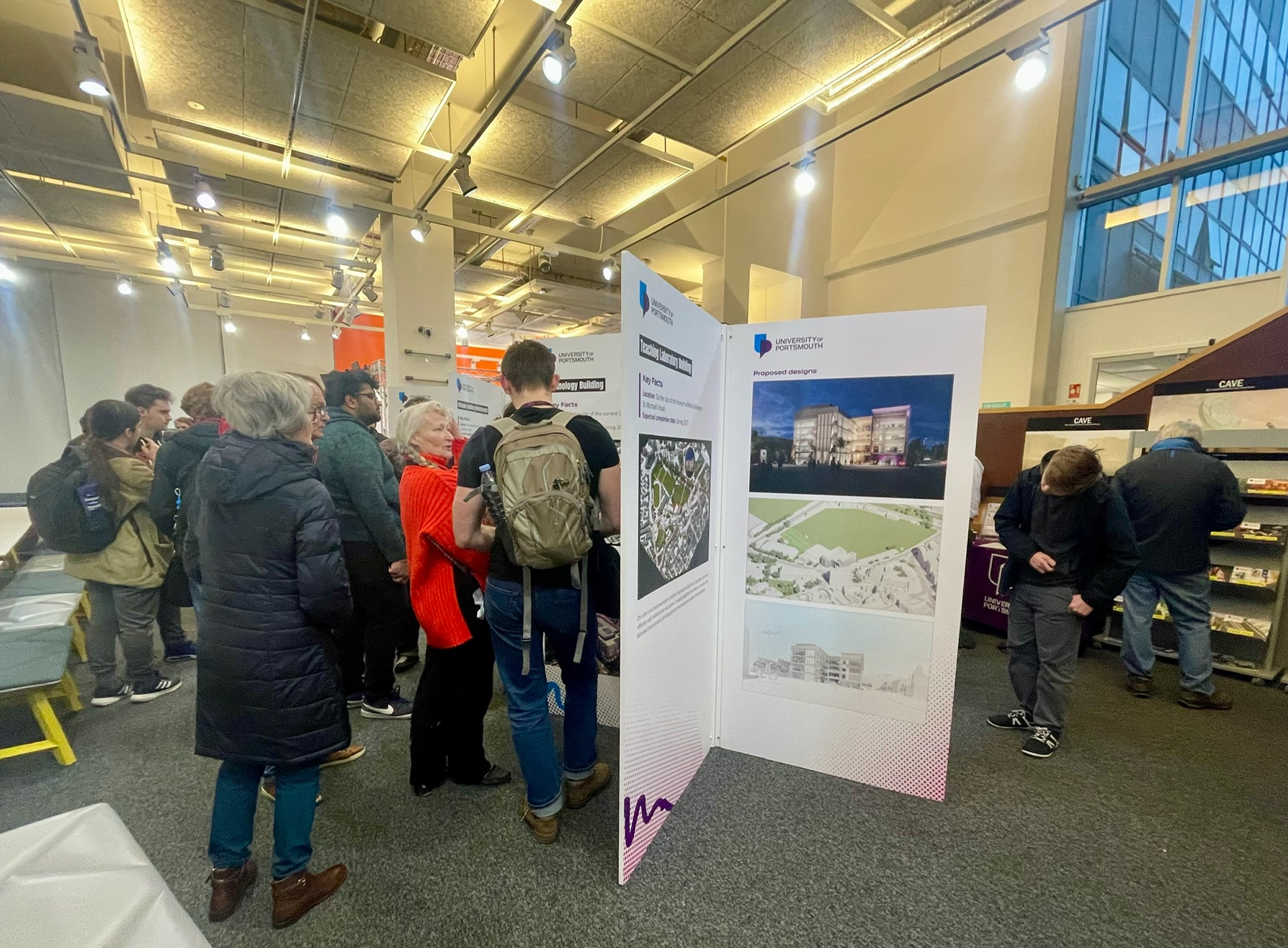
Jump to:
- Vice-Chancellor's Introduction
- Reset
- Sharing your Reset ideas
- Estates Masterplan next steps
- London Campus and London Pathway College
- Digital Transformation - data housekeeping
- Awarding gap - local discussions
- The importance of accredited courses
- Research and innovation highlights
- Upcoming staff events
Vice-Chancellor's Introduction
I think we’re all aware of the financial challenges being faced by the sector due to Government policy, the competitive market for recruiting students, and inflation which means the £9,250 annual tuition fee which hasn’t changed since 2013 is now actually worth around £6,000 a year per student. We have to look carefully at our costs, which is why we’re making tough decisions on savings. I would like to thank colleagues for the way you have responded to these challenges which means we are well on the way to making the changes we need as an institution.
We must invest to attract students, and that balance between savings and investment is explored further in this Bulletin with updates on Reset, the Estates Masterplan, London Campus and Digital Transformation. Staff ideas will be an important part of our future, and in this Bulletin I’ll share further details of how colleagues can help our wider Reset agenda and more specifically on how to close the awarding gap between students of a Black background and White background.
I also want to highlight the importance of accredited courses and some great achievements from our faculties in research and innovation.
And finally, I also want to make you aware of a new Leaders’ Blog which has been created. While I will continue with my Bulletin as always, this new blog will give leaders across the University an opportunity to share information about projects in their areas, thought pieces or more in-depth analysis of a trend or issue such as this recent example from Anne Murphy on Education Priorities.
Reset
Our sector is currently facing numerous challenges, including fixed fees, pension rises and a volatile international recruitment market. If we are to be successful in achieving our Top Modern vision, we must respond to these challenges by doing things differently. This was the purpose of our Reset agenda; a whole University approach where everyone is responsible for reviewing and improving the way that we deliver and support our education and research.
In September 2023 our recruitment figures were lower than expected, meaning our planned expenditure was significantly greater than our income. In response we established the Reset Savings Programme. In this first phase the programme focussed on asking budget holders to reduce expenditure by 10%, thereby bringing our income and expenditure back into balance.
Unfortunately, our January 2024 international recruitment figures were also significantly lower, meaning that we need to take further action to bring our income and expenditure back into balance. Rather than applying a further reduction to all budgets, the second phase of the Reset Savings Programme is focussing on changes that we can make across the University through eight cross-cutting projects. This will help us to reduce costs in an orderly way that rebalances how we use our resources and maintains quality. These projects are currently being developed and proposals will be presented by UEB leads at a combined meeting of UEB and Directors of Professional Services at the end of April.
I realise that this is an uncertain time for everyone across the University. Nonetheless, the most important thing we can all do is make sure that our existing students continue to have the great experience they expect at Portsmouth, and that more applicants choose Portsmouth to study and undertake research. I know that you are working hard to make this happen. We all need to contribute to the Reset agenda that will help us to modernise and improve the way we do things, contributing to our future success. I would like to thank you all for your support and commitment and will share more information about future plans in coming weeks.
Sharing your Reset ideas
When I meet with colleagues across the University I’m often asked about how you can share your improvement ideas. With many initiatives aligned to Reset and strategic aims there will be opportunities for you to contribute locally but we still want to provide a way for you to submit your ideas directly to the Reset Savings Programme.
You can now share your ideas for financial savings, process and other improvements using an online form. Where you have ideas we encourage you to share and discuss these through with your line manager first as it may well be something that you can implement locally and don’t need central permission or coordination. Ideas submitted through the form will be reviewed and feedback provided. We are going to trial this for one month initially. This will help us assess the demand for such a scheme and the best process to support it. We’re setting this process up quickly so please bear with us if it isn’t perfect from day one.
I look forward to seeing your ideas as I am certain you will have proposals that we will not have previously been aware of.
Estates Masterplan next steps
It is important to emphasise that when facing financial challenges, we must not abandon the very investments that will help secure our future. Our capital investment is affordable due to loans and savings and we cannot use this money to cover annual shortfalls in income. Investing in the quality of our estate is a crucial part of the University’s future, and as such contributes to Reset.
I am sure you are aware that we recently ran a three-week public consultation on our revised accelerated Estates Masterplan. The consultation closed on Sunday 3 March 2024 and attracted a high-level of engagement with hundreds of people, including staff, students and the wider Portsmouth community, sharing their views on our broad proposals.
It was great to see so many people attend our community event on 20 February in Eldon Building. I enjoyed talking to the many visitors and hearing a wide variety of thoughts on our plans.
We are aware of how essential the Students’ Union physical spaces are for societies and it was reaffirmed in the open meetings just how vital these groups are for students during their time studying with us. Clearly the construction of the new student hub will disrupt existing student facilities and while the details are not yet confirmed in terms of this impact, what is clear is that it is imperative that suitable spaces are available to meet students' needs during the construction phase. We are working actively with the Students’ Union to find appropriate solutions and a number of very positive possibilities are emerging with details to follow in due course when they can be shared.
Thank you to everyone who has attended an event or sent in their comments. Now that the consultation has closed, the responses will be analysed to help shape planning applications being submitted to Portsmouth City Council shortly. We will share a summary of these results with you. There will also be further opportunity for you to engage as detailed designs are developed for each individual building.


London Campus and London Pathway College
Anticipation is building to welcome our first London Campus students who will be joining us in May. Induction Week for students on the following three postgraduate courses starts on Monday 13 May with teaching starting on Monday 20 May:
- MSc International Business and Management
- MSc Construction Project Management
- MSc Information Systems
Two more taught postgraduate courses and four undergraduate courses will launch in September 2024 as part of our phased approach to growth, which will ultimately lead to a portfolio of around 20 undergraduate and 20 postgraduate courses covering subjects from across our five faculties by 2028/29.
These courses will be taught at Juniper House in Walthamstow - a 1 minute walk from Walthamstow Central Train Station (Overground) and Walthamstow Central Underground. The first London Borough of Culture, Waltham Forest, was chosen as it is an eclectic area and is the only north east London borough without a Higher Education Institute. The London Campus will extend our reach and reputation in the capital city by moving into an area of growing demand and population growth, especially amongst the age range who are most likely to consider university. A London Campus virtual open day for international students will take place on Friday 22 March and an in-person open day will be hosted on Saturday 27 April at Juniper House to help recruit students from September 2024 onwards.
As part of the wider project, we are aiming for the new UoP London dedicated Pathway College to open its doors in September 2024 in collaboration with Northchild. The Pathway will offer pre-degree and pre-masters provision along with pre-sessional English. It will perform a similar role to International College Portsmouth (ICP) but will attract international students for the London Campus where they will continue their studies. The set up and all of the operations and costs of the Pathway College are delivered by our partner Northchild, as part of our three-way partnership with the London Borough of Waltham Forest.
Digital Transformation - data housekeeping
At our recent All Staff Briefing & Q&A we heard more about the Digital Transformation Plan and a requirement for us all to review our data storage in our documents and emails that we have stored in Google and our network drives.
Going forward we need to change our behaviour toward how we manage our data. Historically the University partnered with Google in 2012 to offer Google Workspace for Education, which included unlimited cloud storage. However, in 2021, Google announced that there would be strict storage limits imposed on all Higher Education institutions. To stay within the newly imposed pooled storage limits, the University now has a requirement to reduce the data we store in Google. As a result, unlimited storage for Google Workspace ends on July 1, 2024. In order to stay within the newly imposed pooled storage limits, the University now has a requirement to reduce the data we store in Google or we will face financial penalties as a result.
Therefore, all staff and students must take personal responsibility to delete any data that is not business critical.
As outlined in our Retention Policy, all staff and students have a duty to ensure that records are managed consistently across all faculties, professional services and support services and that they are only retained for as long as necessary to meet operational and business needs, and to demonstrate compliance with legal, regulatory and audit requirements. It applies to all records in whatever format they are held. Any questions regarding retention schedules should be directed to the University Records Manager at recordsmanagement@port.ac.uk. I would also like to draw your attention to available Information Governance Webinars which will support staff in reducing their storage in the correct way.
Awarding gap - local discussions
In April and early May we will be asking schools and departments across the University to hold local discussions about what they can do in their areas to close the awarding gap as students of a Black background receive significantly fewer good degrees (First or 2:1) than students of a White background. These conversations will have three main objectives:
- Raising awareness (including self‐reflection) and continuing engagement
- Committing to make a difference
- Setting out actions we can take in 2023/24 and beyond to narrow the awarding gap
This is an important step as all colleagues can help. You may initially think this is only something that teaching staff can tackle, but this is a bigger, more complex challenge which will involve all academic and professional service departments if we’re to close the gap.
An email will be sent to senior leaders soon with a briefing pack, data and further details about organising these sessions. I would encourage as many colleagues as possible to attend as knowledge, understanding and conversation helps ensure that the gaps stay at the forefront of our minds and that they are taken into consideration when we are making decisions.
The importance of accredited courses
Increasing the number of externally accredited courses in our portfolio is an important part of our strategy to engage every student in a life-changing experience. Accreditations by Professional Statutory and Regulatory Bodies (PSRB) are particularly important to us as a modern university, as they demonstrate that our courses meet stretching professional standards and employer expectations in each subject area. They are also attractive to students and applicants as they can lead to better job opportunities or financial assistance at the start of their careers.
After a rigorous process and huge effort from staff, the Faculty of Business and Law has now been formally notified of its success in achieving the prestigious Association to Advance Collegiate Schools of Business (AACSB) accreditation for an initial 5 year period. The AACSB is the longest standing global business accreditation body, which accredits the world’s best business schools. The accreditation covers all of the business courses offered by the Faculty and ensures that our courses are innovative, engaged with the world of practice and prepare our students for their future careers in global business at the established global standards for teaching, research and professional engagement.
The School of Civil Engineering and Surveying also showed initiative by recently hosting an intensive two-day accreditation visit from the Joint Board of Moderators. Pre-empting changes to learning outcomes, the School invited the moderators to visit with evidence ready to hand from the current academic year and on future plans. The chair of the Industrial Advisory Committee and a Technical Principal at global engineering firm Mott MacDonald was also involved, providing excellent examples of the close working between students and industry through the course.
This all played a part in the accreditation being confirmed for the full 5 year period with no conditions set, negating the need for a review visit in the next couple of years. The course accreditations means that students graduating from the suite of civil engineering courses in the school will continue to have a path to becoming chartered or incorporated engineers in their future careers.
Congratulations to everyone involved as these are excellent examples of how proactive actions can deliver long term results to the benefit of our students.
Research and innovation highlights
There were some notable research and innovation achievements seen over the past few weeks which demonstrate our great ability to win awards, attract funding and work in collaboration with other organisations towards a common goal:
- Led by Professor Andy Pickford, the University’s Centre for Enzyme Innovation (CEI) will spearhead the £11.2m Preventing Plastic Pollution with Engineering Biology (P3EB) Mission Hub to support the transition towards a circular plastics economy in the UK.
- With funding from the Faculty of Technology, the compute power of the SCIAMA Supercomputer has been significantly increased. This will enable improvements to AI and Machine Learning research by carrying out large-scale simulations in a much reduced time.
- Dr Jenny Roddis and Dr Marjolein Woodhouse in the School of Health and Care Professions have been awarded a grant of over £71,000 to investigate who is involved in pressure ulcer prevention in the community in collaboration with Birmingham City University, Solent NHS Trust and colleagues at Portsmouth.
- Also in the Faculty of Science and Health, Dr Sam Robson has been invited to work within the NHS Central & South Genomic Medicine Service Alliance to provide cutting-edge benefits for patients in the NHS who have severe presentations of infectious diseases. And Dr Robbie Baldock is working with Naresuan University in Thailand on how organic compounds found in trees could prevent contact lens eye infections.
- In the Faculty of Creative and Cultural Industries, staff and students from the Television Production course recently won an award at Melbourne WebFest for ‘Offstage’ - a musical reality television mini-series about the lives of aspiring artists. And as an example of graduate success, Alumni Alex Carpenter won an award for cinematography in his graduation film Tinsel.
Upcoming staff events
Here are some dates for your diary:
- All-Staff Briefing and Q&A - Wednesday 20 March 2024 at 1.30pm - Zoom
- Cafe Conversations - Wednesday 17 April 2024 from 2.00pm to 3.00pm with myself, Sherria Hoskins and Jeremy Howells - location TBC